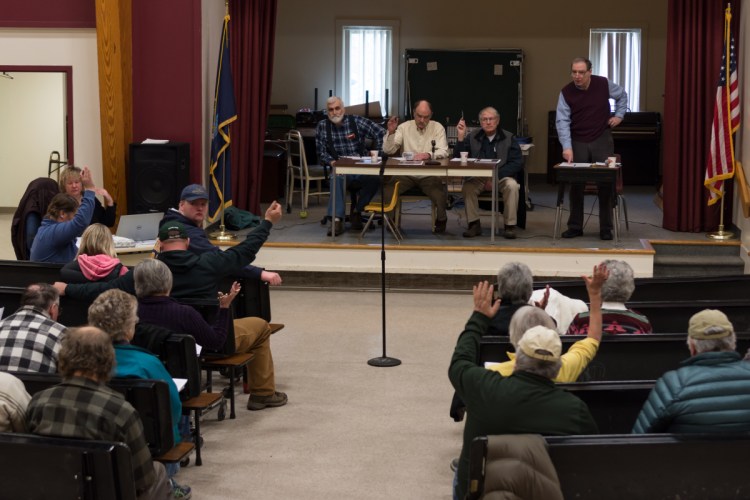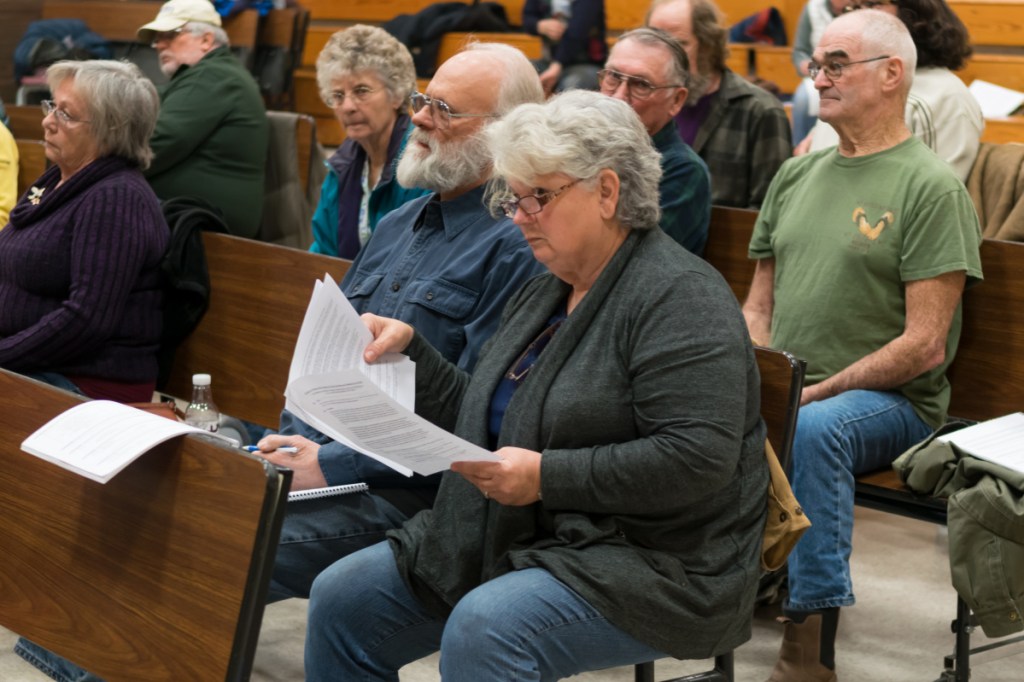STARKS — Town residents on Saturday voted in strong support of an ordinance that exempts many types of locally grown food from state licensing and inspecting requirements.
The “Local Food and Community Self-Governance Ordinance of 2018” follows action at the state level last year that made Maine the second state in the nation to allow consumers to buy directly from farmers and food producers regardless of state and federal licensing and inspections. The vote at Saturday’s Town Meeting in Starks follows similar action in Madison, Solon and about a dozen other communities in Maine.
“On occasion, state and federal law gets into places where it really doesn’t belong,” said Selectman Ernest Hilton, who worked on the ordinance with Rep. Craig Hickman, D-Winthrop.
He described “a massive panoply of ordinances” from the U.S. Department of Agriculture, the state Department of Agriculture and the federal Food and Drug Administration that makes direct-to-consumer sales of items such as milk unnecessarily complicated.
The Starks ordinance does not cover meat or poultry, which still will be subject to state inspection.
The ordinance reads, in part: “All individuals have a natural, inherent, and unalienable right to acquire, produce, process, prepare, preserve and consume the food of their own choosing for their own nourishment and sustenance. Furthermore, all individuals have a right to barter, trade and purchase food and to save and exchange seed from the sources of their own choosing for their own physical health and well-being.”
Town resident Casey O’Connor asked what would happen if he bought spoiled milk from a neighbor, prompting Hilton to reply that if that were the case, it would be easy to know where the bad product came from.
“When you look at food poisoning, it is almost always a matter of a huge processor” that then distributes food across the country, making it difficult to identify the source, he said.
With little additional discussion, most of the approximately 35 residents present voted in favor of the ordinance toward the end of a meeting that lasted more than four hours.
The current tax rate is $16.75 for every $1,000 in property valuation, and following Saturday’s Town Meeting, it’s expected to be no higher than $17. The municipal budget is about $900,000.
Town residents spent considerable time discussing expenses for the Fire Department, whether to authorize selectmen to buy a new or used plow truck and what to do with the former Town Office building on Locke Hill Road.
Fire Chief William Pressey said the Fire Department requested $41,000, up from $38,500, so the department can buy two additional self-contained breathing apparatuses. He said as it is now, two firefighters can’t enter buildings during a fire because they don’t have the right gear.
One woman in the crowd asked if the town could give the Fire Department $1,000 more than what the chief requested in the budget, but moderator Denis Culley said Town Meeting rules don’t allow budget items to be increased, only decreased.
Residents ultimately approved the $41,000 Fire Department budget and a separate warrant article that requested $35,000 for improvements and repairs to the fire station.
Pressey said the metal building does not have proper eaves, so snow slides off the sides of the fire station and damages the building.
“The building is crinkled all around the outside,” he said. “We’re going to lose the building eventually if it isn’t addressed.”
When it comes to snowplow needs, Pressey and others said one plow now in service needs constant repairs, frustrating drivers who are trying to make the roads safe for drivers. Hilton said he has spoken with the Maine Turnpike Authority and Maine Department of Transportation about the possibility of buying used plows when they come up for auction. Buying a new plow truck could cost $200,000, while some used trucks can be purchased for closer to $10,000, he said.
After a few minutes of additional discussion, residents voted to authorize selectmen to use money from the town’s capital improvement account — which has a balance of more than $56,000 — to pursue the purchase of one or two replacement plow trucks. In addition, residents directed selectmen to put any money generated from the sale of the old truck or trucks back into the capital improvement account.
There was much debate about what to do with the former Town Office, which most recently had been rented out by selectmen to a variety of businesses. Hilton said he met with a group of people who might want to use it as a food processing and selling facility, and that he felt strongly that the town should continue to have the power to control what happens with the building.
“It’s visually important to the village,” he said. “I’d hate to see the town lose control to that piece of property. I would oppose selling it without a lot more discourse and thought.”
Others described the property as a drain on town resources and encouraged selectmen to consider selling it to get it back on the tax rolls. The warrant article from selectmen asked for guidance from town residents, but no final decision was made about whether selectmen should lease the building or sell it.
Residents also questioned the town’s continued participation in the Kennebec Regional Development Authority’s FirstPark in Oakland, a business park supported by two dozen municipalities in central Maine. The town is required to contribute $4,500 in the coming year to the project, which is designed to bring jobs to the area.
Selectman Paul Frederic said Starks is the smallest town in the organization and noted that it’s difficult to drop out of the group. The bond that supports the project expires in 2021.
“It’s been a money loser for the town for over a decade, and I don’t know if it will turn itself around,” he said. “It was based on the pot of gold at the end of the rainbow idea.”
Send questions/comments to the editors.




